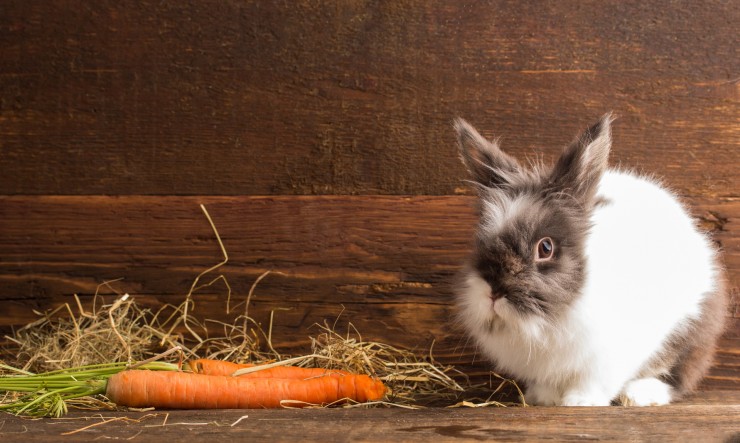

In order to keep a domestic rabbit happy and healthy, their digestive system needs to be in constant motion, and if they stop eating for even a couple of hours or develop a problem such as constipation, this can cause real problems. When the digestive system of the rabbit stops moving, it is really hard to kick-start it again, and may require a visit to the vets in order to resolve the problem and preserve your rabbit’s health.
In the wild, domestic rabbits eat grass and leafy greens virtually continually, and this makes up the bulk of their diet, topped up by the occasional windfall or tasty morsel of certain fruit and veg that they manage to find! In order to provide the correct diet for the domestic rabbit, these too should have access to lots of roughage to chew on continually, ideally in the form of fresh grass grazing, but if this is not possible, hay is an appropriate substitute.
The diet of our domestic rabbits also needs to be supplemented with a complete food and some fresh offerings too, such as leafy greens, and other fruit and veg. However, you cannot simply give your rabbit household scraps or any vegetable or fruit in order to fulfil this need-certain common and popular plants and vegetables are actually poisonous for rabbits, or likely to upset their digestive systems and threaten their gut motility.
In this article, we will share a basic description of some common and popular fruits and vegetables that are not suitable for rabbits, which can provide a basic frame of reference when deciding what to feed to your pet. Read on to learn more.
The vast majority of common and popular fruits that you can buy in the UK or even potentially grow in your garden are safe for rabbits, but as fruit is rich and high in sugar, actual fruit itself should not be fed to excess. You should also avoid feeding under or overripe fruit to your rabbit, as both can lead to digestive upsets and so, adversely affect your rabbit’s health.
It is wise also to remove all stones, seeds and pips from fruit where possible, as certain seeds and stones, notably those from apples, contain cyanide, which is of course a poison. While rabbits would need to ingest a large quantity of pips to become very ill, it is wise to play it safe! Stones and pits from virtually all fruit including cherries, apricots and mango too can contain poisonous compounds, so remove these before feeding them to your rabbit.
Fruit with tiny seeds such as strawberries and grapes are generally fine and do not need their seeds to be removed-but if fed in excess, can lead to diarrhoea, as they are rich in sugar and so, should be kept just for treats!
Avocado is one vegetable that should not be fed to rabbits, as it contains a small amount of a toxin called persin, which is a fungicidal compound that can make rabbits quite ill. Additionally, avocado is very rich and high in oils, and so can lead to weight gain and digestive upsets too.
All vegetables from the onion grouping are a bad idea for rabbits, and this includes onions of all types including spring onions, garlic, and even chives. Veg from the onion family can lead to severe diarrhoea and stomach upsets, which can be very serious and even potentially fatal.
You should not feed your rabbit nuts of any type either (including peanuts, which are actually a legume) because these are incredibly high in calories, and while not toxic, can lead to obesity which in turn can shorten your rabbit’s lifespan.
Steer clear too of root vegetables such as potato, as this is low in nutritional content, and also in particular veg from the parsnip group, as one of the compounds within parsnips can be poisonous.
Also, it is worth bearing in mind that while tomatoes are fine for rabbits, tomato plants should not be nibbled on, so if you grow your own vegetables, fence them off!
As well as taking care about the fruit and vegetables that you feed to your rabbit, you should also take care over potential toxins growing in your garden! Daisies and dandelions are perfectly suitable roughage and fibre for rabbits, but some other plants that you might grow deliberately or find growing wild in your hedges are not.
Rhubarb is one plant that is very dangerous for not only rabbits but other grazing animals like Guinea pigs too, and this includes the leaves and the fruit of the plant as well. If you know or suspect that your rabbit has eaten or been fed rhubarb, contact your vet immediately, as it can make your pet very sick.
Any white berries are potentially toxic to rabbits, as are the berries of plants like ivy, mistletoe and holly. The leaves of ivy as well can be toxic to rabbits, so if you have ivy growing on your house, try to cut it down so that it only grows above the level that your rabbit can reach.
Finally, foxgloves contain a compound called digitalis, which can lead to cardiac arrest if ingested-keep foxgloves out of your garden and hedges. Interestingly, deadly nightshade is generally not at all harmful to rabbits, unless ingested in serious quantities!
Copyright © 2005-2016 Pet Information All Rights Reserved
Contact us: www162date@outlook.com